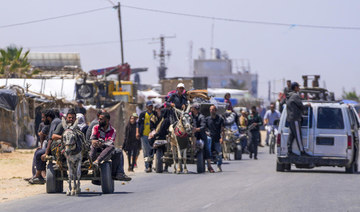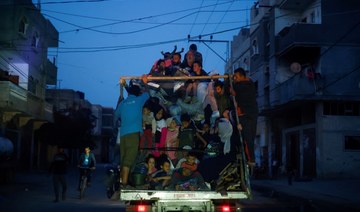NEW YORK: As students protesting the Israel-Hamas war at universities across US dug in Saturday and vowed to keep their demonstrations going, some universities shut down encampments after reports of antisemitic activity among the protesters.
With the death toll mounting in the war in Gaza, protesters nationwide are demanding that schools cut financial ties to Israel and divest from companies they say are enabling the conflict. Some Jewish students say the protests have veered into antisemitism and made them afraid to set foot on campus.
Early Saturday, police in riot gear cleared an encampment on the campus of Northeastern University in Boston while several dozen students shouted and booed at them from a distance, but the scene was otherwise not confrontational.
The school said in a statement that the demonstration, which began two days ago, had become “infiltrated by professional organizers” with no affiliation to the school and protesters had used antisemitic slurs.
“We cannot tolerate this kind of hate on our campus,” the statement posted on the social media platform X said.
The University of Pennsylvania took similar action Friday when interim President J. Larry Jameson called for an encampment of protesters on the west Philadelphia campus to be disbanded, saying it violates the university’s facilities policies.
The “harassing and intimidating comments and actions” by some protesters violate the school’s open expression guidelines as well as state and federal law, Jameson said, and vandalism of a statue with antisemitic graffiti was “especially reprehensible and will be investigated as a hate crime.”
“I am deeply saddened and troubled that our many efforts to respectfully engage in discourse, support open expression, and create a community that is free of hate and inclusive for everyone have been ignored by those who choose to disrupt and intimidate,” he said.
At Columbia University, where protesters have inspired pro-Palestinian demonstrations across the country, negotiations continued with those at the student encampment.
The university’s senate passed a resolution Friday that created a task force to examine the administration’s leadership, which last week called in police in an attempt to clear the protest, resulting in scuffles and more than 100 arrests.
Though the university has repeatedly set and then pushed back deadlines for the removal of the encampment, the school sent an email to students Friday night saying that bringing back police “at this time” would be counterproductive.
Decisions to call in law enforcement, leading to hundreds of arrests nationwide, have prompted school faculty members at universities in California, Georgia and Texas to initiate or pass votes of no confidence in their leadership. They are largely symbolic rebukes, without the power to remove their presidents.
But the tensions pile pressure on school officials, who are already scrambling to resolve the protests as May graduation ceremonies near.
California State Polytechnic University, Humboldt, gave protesters who have barricaded themselves inside a building since Monday until 5 p.m. Friday to leave and “not be immediately arrested.” The deadline came and went. Only some of the protesters left, others doubled down. After protesters rebuffed police earlier in the week, the campus was closed for the rest of the semester.
In Colorado, police swept through an encampment Friday at Denver’s Auraria Campus, which hosts three universities and colleges, arresting about 40 protesters on trespassing charges.
Students representing the Columbia encampment said Friday that they reached an impasse with administrators and intend to continue their protest. After meetings Thursday and Friday, student negotiators said the university had not met their primary demand for divestment.
In the letter sent to Columbia students Friday night, the university’s leadership said “we support the conversations that are ongoing with student leaders of the encampment.”
Columbia’s president, Minouche Shafik, faced significant criticism from faculty Friday, but retained the support of trustees.
A report by the university senate’s executive committee, which represents faculty, found Shafik and her administration took “many actions and decisions that have harmed Columbia University.” Those included calling in police and allowing students to be arrested without consulting faculty, misrepresenting and suspending student protest groups and hiring private investigators.
Also Friday, Columbia student protester Khymani James walked back comments made in an online video in January that recently received new attention. James said in the video that “Zionists don’t deserve to live” and people should be grateful James wasn’t killing them.
“What I said was wrong,” James said in a statement. “Every member of our community deserves to feel safe without qualification.”
James, who served as a spokesperson for the pro-Palestinian encampment as a member of Columbia University Apartheid Divest, was banned from campus Friday, according to a Columbia spokesperson.
Protest organizers said James’ comments didn’t reflect their values. They declined to describe James’ level of involvement with the demonstration.
In France, students at the Paris Institute of Political Studies, which counts President Emmanuel Macron among its many famous alumni, students blocked access to a campus building and classes went online as the wave of protests reached overseas.
Police clashed with protesters Thursday at Indiana University, Bloomington, where 34 were arrested; Ohio State University, where about 36 were arrested; and at the University of Connecticut, where one person was arrested.
The University of Southern California canceled its May 10 graduation ceremony Thursday, a day after more than 90 protesters were arrested on campus. The university said it will still host dozens of commencement events, including all the traditional individual school ceremonies.
Universities where faculty members have initiated or passed votes of no confidence in their presidents include Cal Poly Humboldt, University of Texas at Austin and Emory University.
Anti-war protesters dig in as some schools close encampments after reports of antisemitic activity
https://arab.news/5wq76
Anti-war protesters dig in as some schools close encampments after reports of antisemitic activity
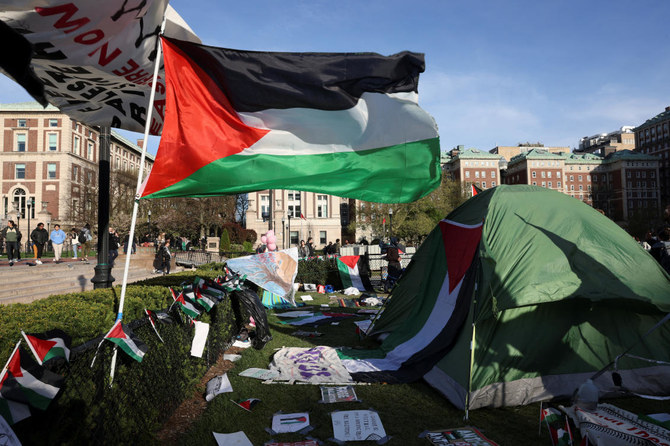
- Protesters nationwide are demanding that schools cut financial ties to Israel and divest from companies they say are enabling the conflict
- Early Saturday, police in riot gear cleared an encampment on the campus of Northeastern University in Boston while several dozen students shouted and booed at them
Philippines invites Saudi partnerships in halal industry, renewables
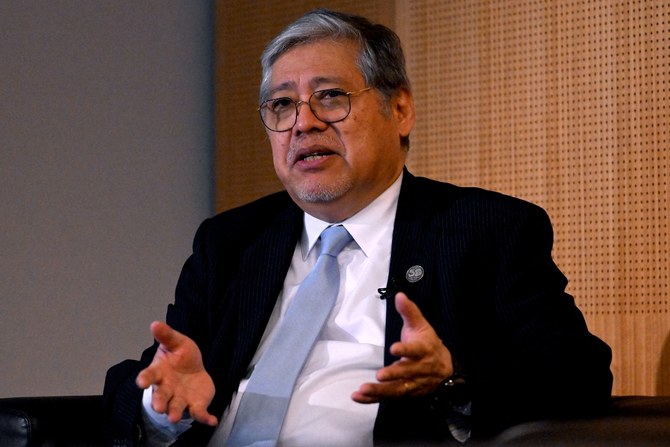
- Govt wants renewables to contribute 35% to energy mix by 2030
- It launched strategic plan to develop domestic halal industry in January
MANILA: The Philippines says it is open to expanding partnerships with Saudi Arabia in its top priority sectors, including renewable energy and the halal industry.
The use of renewable energy was announced as the main issue in the country’s climate agenda during President Ferdinand Marcos Jr.’s first state of the nation address in 2022.
Renewable energy contributes about 30 percent to the Philippines’ energy mix, which is dominated by coal and oil. The government seeks to increase it to 35 percent by 2030 and 50 percent by 2040, and make renewables more accessible to the public.
“Given the Kingdom’s role in the supply of conventional and renewable energy, the Philippines is open to possible partnerships in the field of renewables,” Foreign Affairs Secretary Enrique Manalo told Arab News this week.
An agreement to enhance cooperation in the field was reached in October, during President Ferdinand Marcos’ visit to the Kingdom at the invitation of Saudi Crown Mohammed bin Salman.
A business delegation accompanying the president signed investment agreements collectively worth more than $4.26 billion with Saudi business leaders.
“With Saudi Arabia’s role as a regional business and political hub, we wish to increase investments,” Manalo said.
“Further, amidst the region’s changing landscape and economic diversification initiatives, we aspire to expand our partnership in the fields of agriculture, tourism and the halal industry.”
In January, the predominantly Catholic Philippines — where Muslims constitute about 10 percent of the almost 120 million population — launched its Halal Industry Development Strategic Plan to tap into the global halal market, which is estimated to be worth more than $7 trillion.
The plan aims to double the industry’s output in the next four years, create 120,000 new jobs and attract $4 billion in investments by 2028.
Greece to bring in Egyptian farm workers amid labor shortage
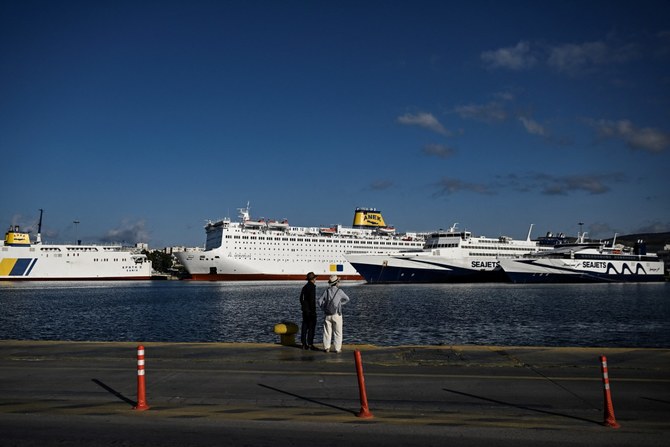
- Greece will take in around 5,000 seasonal farm workers under the 2022 deal signed with Egypt
ATHENS: Greece will start bringing in workers from Egypt this summer to take on temporary farming jobs under a deal between the countries to tackle a labor shortage, the migration ministry said on Friday.
After a decade of pain, the Greek economy is forecast to grow nearly 3 percent this year, far outpacing the euro zone average of 0.8 percent.
But an exodus of workers during Greece’s economic crisis, a shrinking population and strict migration rules have left the country struggling to find tens of thousands of workers to fill vacancies in farming, tourism, construction and other sectors.
Greece will take in around 5,000 seasonal farm workers under the 2022 deal signed with Egypt.
The countries have discussed expanding the “mutually beneficial” scheme to the Greek construction and tourism sectors, the Greek Migration Ministry said in a statement.
Migration has long been a divisive issue in Europe, but the plan had won broad support from employers groups keen to find workers.
Greek Migration Minister Dimitris Kairidis met Egyptian Labour Minister Hassan Shehata in Cairo this week and said the countries should also step up cooperation to fend off illegal migration flows in the region.
Egyptian officials have said their country deserves recognition for largely stopping migrants setting off from its northern coast across the Mediterranean to Europe since 2016.
The European Union this year announced a multi-billion euro funding package and an upgraded relationship with Egypt, part of a push to cut down on the number of migrants crossing over from North Africa.
Rights groups have criticized Western support for Egyptian President Abdel Fattah El-Sisi, who came to power a decade ago after leading the overthrow of Egypt’s first democratically elected leader.
India says Canada has shared no evidence of its involvement in killing of Sikh separatist leader
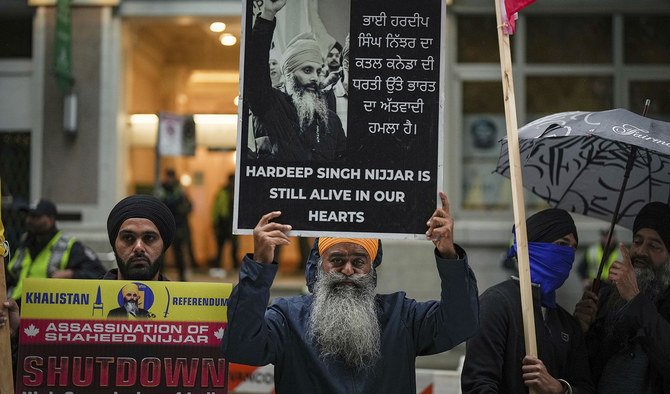
- Three Indian nationals who had been temporarily living in Canada were arrested on Tuesday in the June slaying of Hardeep Singh Nijjar
- PM Trudeau set off a diplomatic spat with India in Sept. when he cited ‘credible allegations’ of India’s involvement in the Sikh’s murder
NEW DELHI: India said Thursday that Canada has shared no evidence to back its allegation that the Indian government was involved in the slaying of a Sikh separatist leader in Canada last year, despite the recent arrests of three Indian men in the crime.
India’s External Affairs Ministry spokesman Randhir Jaiswal also reiterated India’s longstanding allegation that Canada harbors Indian extremists.
Three Indian nationals who had been living in Canada temporarily were arrested on Tuesday in the slaying last June of Hardeep Singh Nijjar in British Columbia. Canadian Prime Minister Justin Trudeau had set off a diplomatic spat with India last September when he cited “credible allegations” of India’s involvement in the slaying of the Sikh separatist. India rejected the accusations.
Canadian Mounted Police Superintendent Mandeep Mooker said after the men’s arrests that the investigation into whether they had ties to India’s government was ongoing.
Jaiswal said the two governments are discussing the case but that Canada has forwarded no specific evidence of the Indian government’s involvement.
Meanwhile, Jaiswal said New Delhi has complained to Canadian authorities that separatists, extremists and those advocating violence against India have been allowed entry and residency in Canada. “Many of our extradition requests are pending,” he said.
“Our diplomats have been threatened with impunity and obstructed in their performance of duties,” Jaiswal added. “We are having discussions at the diplomatic level on all these matters,” he said.
The three Indian men arrested in Canada haven’t yet sought any access to the Indian diplomats there, Jaiswal said.
The three — Kamalpreet Singh, 22, Karan Brar, 22, and Karanpreet Singh, 28 — appeared in court Tuesday via a video link and agreed to a trial in English. They were ordered to appear in British Columbia Provincial Court again on May 21.
They were arrested last week in Edmonton, Alberta. They have been charged with first-degree murder and conspiracy to commit murder.
Spain, Ireland to recognize Palestinian state on May 21 — EU’s Borrell
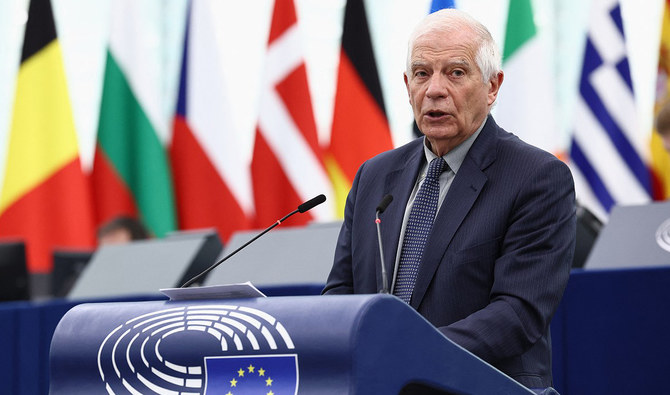
- Calls for end to Palestinian-Israeli conflict have grown along with the death toll from Israel’s war on Gaza
- Spain, others agreed to recognition of Palestinian state, seeing a two-state solution as essential for peace
MADRID: Spain, Ireland and other European Union member countries plan to recognize a Palestinian state on May 21, the EU’s foreign policy chief, Josep Borrell, said late on Thursday ahead of an expected UN vote on Friday on a Palestinian bid to become a full member.
Spanish Prime Minister Pedro Sanchez said in March that Spain and Ireland, along with Slovenia and Malta, had agreed to take the first steps toward recognition of a Palestinian state alongside Israel, seeing a two-state solution as essential for lasting peace.
Asked on local Spanish radio station RNE if May 21 was when Spain, Ireland and other EU countries would recognize a Palestinian state, Borrell said yes, mentioning Slovenia as well.
“This is a symbolic act of a political nature. More than a state, it recognizes the will for that state to exist,” he said, adding that Belgium and other countries would probably follow.
Previously, Spanish Foreign Minister Jose Manuel Albares had said the decision on recognition had been made, although he did not give a date.
International calls for a ceasefire and permanent end to Palestinian-Israeli conflict have grown along with the death toll from Israel’s offensive in Gaza to rout out Hamas after the militants’ deadly cross-border attack on Oct. 7.
Israel has said plans for Palestinian recognition constitute a “prize for terrorism” that would reduce the chances of a negotiated resolution to the Gaza conflict.
On Friday the United Nations General Assembly is set to back a Palestinian bid to become a full UN member by recognizing it as qualified to join and sending the application back to the UN Security Council to “reconsider the matter favorably.”
Ireland’s national broadcaster RTE said on Thursday that Spain, Ireland, Slovenia and Malta had been waiting for the UN vote and were considering a joint recognition on May 21.
A spokesperson for the Spanish Foreign Ministry did not immediately respond to a request for comment. There was no immediate comment on the date from the other countries.
Slovenian Prime Minister Robert Golob said earlier this week his country would recognize Palestine’s statehood by mid June.
Since 1988, 139 out of 193 UN member states have recognized Palestinian statehood.
Spain, Ireland to recognize Palestinian state on May 21 — EU’s Borrell
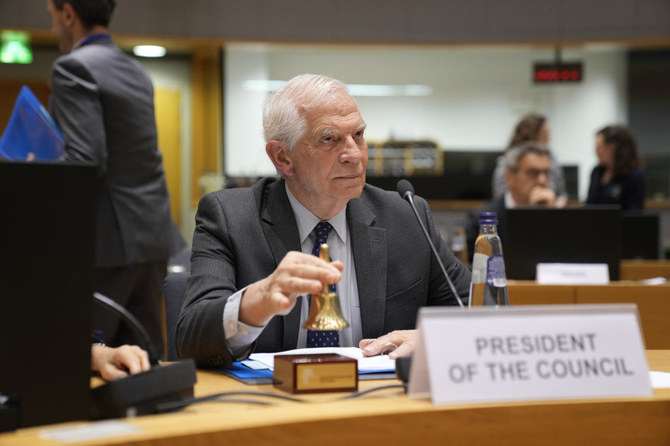
- Spain and Ireland, along with Slovenia and Malta, had agreed to take the first steps toward recognition of a Palestinian state alongside Israel
MADRID: Spain, Ireland and other European Union member countries plan to recognize a Palestinian state on May 21, the EU’s foreign policy chief, Josep Borrell, said late on Thursday ahead of an expected UN vote on Friday on a Palestinian bid to become a full member.
Spanish Prime Minister Pedro Sanchez said in March that Spain and Ireland, along with Slovenia and Malta, had agreed to take the first steps toward recognition of a Palestinian state alongside Israel, seeing a two-state solution as essential for lasting peace.
Asked on local Spanish radio station RNE if May 21 was when Spain, Ireland and other EU countries would recognize a Palestinian state, Borrell said yes, mentioning Slovenia as well.
“This is a symbolic act of a political nature. More than a state, it recognizes the will for that state to exist,” he said, adding that Belgium and other countries would probably follow.
Previously, Spanish Foreign Minister Jose Manuel Albares had said the decision on recognition had been made, although he did not give a date.
International calls for a ceasefire and permanent end to Palestinian-Israeli conflict have grown along with the death toll from Israel’s offensive in Gaza to rout out Hamas after the militants’ deadly cross-border attack on Oct. 7.
Israel has said plans for Palestinian recognition constitute a “prize for terrorism” that would reduce the chances of a negotiated resolution to the Gaza conflict.
On Friday the United Nations General Assembly is set to back a Palestinian bid to become a full UN member by recognizing it as qualified to join and sending the application back to the UN Security Council to “reconsider the matter favorably.”
Ireland’s national broadcaster RTE said on Thursday that Spain, Ireland, Slovenia and Malta had been waiting for the UN vote and were considering a joint recognition on May 21.
A spokesperson for the Spanish Foreign Ministry did not immediately respond to a request for comment. There was no immediate comment on the date from the other countries.
Slovenian Prime Minister Robert Golob said earlier this week his country would recognize Palestine’s statehood by mid June.
Since 1988, 139 out of 193 UN member states have recognized Palestinian statehood.









